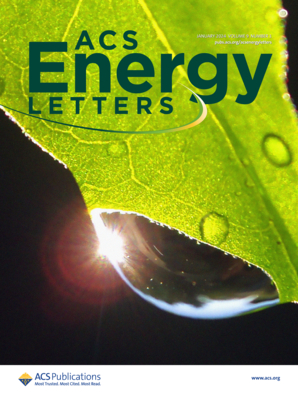F-Free Pressure-Sensitive Adhesives as Dry-Coating Process Binders for Ultrahigh-Loading Graphite Anodes
IF 19.3
1区 材料科学
Q1 CHEMISTRY, PHYSICAL
引用次数: 0
Abstract
High-loading electrode engineering is a cost-effective and practical method of increasing the energy density by minimizing the content of inactive materials in the cell. However, sluggish Li-ion intercalation at the graphite anodes during the charging process results in capacity limitations and cycling deterioration. For the first time, we present herein a pressure-sensitive adhesive (PSA) based on F-free styrene–butadiene rubber (SBR). When subjected to external pressure calendaring at room temperature, PSA-SBR becomes highly sticky, enabling a solvent-free dry-coating process. This approach results in the formation of flexible, freestanding electrode films and creates an open-channel interface on the graphite surface, thereby reducing interfacial resistance. Additionally, it establishes a low-resistance solid electrolyte interphase, particularly when using a fluoroethylene carbonate additive, leading to a stable cell performance with an areal capacity of 10.6 mAh cm–2. This binder shows potential applicability to other high-loading electrodes with significant interfacial resistances.

无氟压敏胶粘剂作为超高负载石墨阳极干涂工艺粘合剂
高负荷电极工程是通过减少电池中非活性物质的含量来提高能量密度的一种经济实用的方法。然而,在充电过程中,锂离子在石墨阳极的缓慢插入导致容量限制和循环恶化。本文首次提出了一种基于无氟丁苯橡胶(SBR)的压敏胶(PSA)。当在室温下进行外压压延时,PSA-SBR变得高度粘性,从而实现无溶剂干涂工艺。这种方法形成了灵活的、独立的电极薄膜,并在石墨表面形成了一个开放的通道界面,从而减少了界面阻力。此外,它建立了一个低电阻的固体电解质间相,特别是当使用氟乙烯碳酸酯添加剂时,导致电池性能稳定,面积容量为10.6 mAh cm-2。这种粘合剂显示出对其他具有显著界面电阻的高负载电极的潜在适用性。
本文章由计算机程序翻译,如有差异,请以英文原文为准。
求助全文
约1分钟内获得全文
求助全文
来源期刊

ACS Energy Letters
Energy-Renewable Energy, Sustainability and the Environment
CiteScore
31.20
自引率
5.00%
发文量
469
审稿时长
1 months
期刊介绍:
ACS Energy Letters is a monthly journal that publishes papers reporting new scientific advances in energy research. The journal focuses on topics that are of interest to scientists working in the fundamental and applied sciences. Rapid publication is a central criterion for acceptance, and the journal is known for its quick publication times, with an average of 4-6 weeks from submission to web publication in As Soon As Publishable format.
ACS Energy Letters is ranked as the number one journal in the Web of Science Electrochemistry category. It also ranks within the top 10 journals for Physical Chemistry, Energy & Fuels, and Nanoscience & Nanotechnology.
The journal offers several types of articles, including Letters, Energy Express, Perspectives, Reviews, Editorials, Viewpoints and Energy Focus. Additionally, authors have the option to submit videos that summarize or support the information presented in a Perspective or Review article, which can be highlighted on the journal's website. ACS Energy Letters is abstracted and indexed in Chemical Abstracts Service/SciFinder, EBSCO-summon, PubMed, Web of Science, Scopus and Portico.
 求助内容:
求助内容: 应助结果提醒方式:
应助结果提醒方式:


